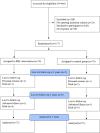Does problem-based learning improve patient empowerment and cardiac risk factors in patients with coronary heart disease in a Swedish primary care setting? A long-term prospective, randomised, parallel single randomised trial (COR-PRIM)
- PMID: 36828650
- PMCID: PMC9972427
- DOI: 10.1136/bmjopen-2022-065230
Does problem-based learning improve patient empowerment and cardiac risk factors in patients with coronary heart disease in a Swedish primary care setting? A long-term prospective, randomised, parallel single randomised trial (COR-PRIM)
Abstract
Objectives: To investigate long-term effects of a 1-year problem-based learning (PBL) on self-management and cardiac risk factors in patients with coronary heart disease (CHD).
Design: A prospective, randomised, parallel single centre trial.
Settings: Primary care settings in Sweden.
Participants: 157 patients with stable CHD completed the study. Subjects with reading and writing impairments, mental illness or expected survival less than 1 year were excluded.
Intervention: Participants were randomised and assigned to receive either PBL (intervention) or home-sent patient information (control group). In this study, participants were followed up at baseline, 1, 3 and 5 years.
Primary and secondary outcomes: Primary outcome was patient empowerment (Swedish Coronary Empowerment Scale, SWE-CES) and secondary outcomes General Self-Efficacy Scale (GSES), self-rated health status (EQ-VAS), high-density lipoprotein cholesterol (HDL-C), body mass index (BMI), weight and smoking. Outcomes were adjusted for sociodemographic factors.
Results: The PBL intervention group resulted in a significant improved change in SWE-CES over the 5-year period (mean (M), 39.39; 95% CI 37.88 to 40.89) compared with the baseline (M 36.54; 95% CI 35.40 to 37.66). PBL intervention group increased HDL-C level (M 1.39; 95% CI 1.28 to 1.50) compared with baseline (M 1.24; 95% CI 1.15 to 1.33) and for EQ-VAS (M 77.33; 95% CI 73.21 to 81.45) compared with baseline (M 68.13; 95% CI 63.66 to 72.59) while these outcomes remained unchanged in the control group. There were no significant differences in BMI, weight or scores on GSES, neither between nor within groups over time. The overall proportion of smokers was significantly higher in the control group than in the experimental group.
Conclusion: One-year PBL intervention had positive effect on patient empowerment, health status and HDL-C at a 5-year follow-up compared with the control group. PBL education aiming to improve patient empowerment in cardiac rehabilitation should account for sociodemographic factors.
Trial registration number: NCT01462799.
Keywords: Coronary heart disease; EDUCATION & TRAINING (see Medical Education & Training); PRIMARY CARE.
© Author(s) (or their employer(s)) 2023. Re-use permitted under CC BY-NC. No commercial re-use. See rights and permissions. Published by BMJ.
Conflict of interest statement
Competing interests: None declared.
Figures
Similar articles
-
The effect of problem-based learning after coronary heart disease - a randomised study in primary health care (COR-PRIM).BMC Cardiovasc Disord. 2020 Aug 14;20(1):370. doi: 10.1186/s12872-020-01647-2. BMC Cardiovasc Disord. 2020. PMID: 32795267 Free PMC article. Clinical Trial.
-
The effect of problem-based learning in patient education after an event of CORONARY heart disease--a randomised study in PRIMARY health care: design and methodology of the COR-PRIM study.BMC Fam Pract. 2012 Nov 20;13:110. doi: 10.1186/1471-2296-13-110. BMC Fam Pract. 2012. PMID: 23164044 Free PMC article. Clinical Trial.
-
Patient empowerment and general self-efficacy in patients with coronary heart disease: a cross-sectional study.BMC Fam Pract. 2018 May 30;19(1):76. doi: 10.1186/s12875-018-0749-y. BMC Fam Pract. 2018. PMID: 29843619 Free PMC article.
-
Adult patient access to electronic health records.Cochrane Database Syst Rev. 2021 Feb 26;2(2):CD012707. doi: 10.1002/14651858.CD012707.pub2. Cochrane Database Syst Rev. 2021. PMID: 33634854 Free PMC article.
-
Behavioural modification interventions for medically unexplained symptoms in primary care: systematic reviews and economic evaluation.Health Technol Assess. 2020 Sep;24(46):1-490. doi: 10.3310/hta24460. Health Technol Assess. 2020. PMID: 32975190 Free PMC article.
Cited by
-
Cognition of diet quality and dietary management in elderly patients with coronary and other atherosclerotic vascular disease in western China, a qualitative research study.BMC Geriatr. 2024 Jun 17;24(1):525. doi: 10.1186/s12877-024-05058-2. BMC Geriatr. 2024. PMID: 38886659 Free PMC article.
-
Adapting power calculations to include a superiority margin: what are the implications?Biochem Med (Zagreb). 2024 Feb 15;34(1):010101. doi: 10.11613/BM.2024.010101. Biochem Med (Zagreb). 2024. PMID: 38361735 Free PMC article. Review.
References
-
- WHO . Global health estimates 2020: deaths by cause, age, sex, by country and by region, 2000-2019. Geneva: World Health Organization; 2020. Available: https://www.who.int/data/gho/data/themes/mortality-and-global-health-est...
-
- Ambrosetti M, Abreu A, Corra U, et al. . Secondary prevention through comprehensive cardiovascular rehabilitation: from knowledge to implementation update. A position paper from the secondary prevention and rehabilitation section of the European association of preventive cardiology. Eur J Prev Cardiol 2020;2020. 10.1177/2047487320913379 - DOI - PubMed
Publication types
MeSH terms
Associated data
LinkOut - more resources
Full Text Sources
Medical


